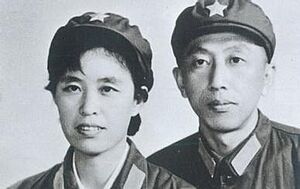Yan Su facts for kids
Quick facts for kids
Yan Su
|
|||||||
|---|---|---|---|---|---|---|---|
| 阎肃 | |||||||

Yan Su (right) and his wife, Li Wenhui (left)
|
|||||||
| Born |
Yan Zhiyang (Chinese: 阎志扬)
May 9, 1930 Baoding, Hebei, China
|
||||||
| Died | February 12, 2016 (aged 85) Beijing, China
|
||||||
| Alma mater | Chongqing Nankai School Chongqing University |
||||||
| Occupation | Lyricist, military officer | ||||||
| Years active | 1953–2016 | ||||||
| Spouse(s) |
Li Wenhui
(m. 1961) |
||||||
| Children | 2 | ||||||
| Musical career | |||||||
| Genres | Ethnic music, military song | ||||||
| Chinese name | |||||||
| Traditional Chinese | 閻肅 | ||||||
| Simplified Chinese | 阎肃 | ||||||
|
|||||||
Yan Su (Chinese: 阎肃; May 9, 1930 – February 12, 2016) was a very famous Chinese writer and songwriter. He wrote many plays and song lyrics. He was also a high-ranking officer in the Chinese Air Force's performing arts group. Yan Su was known as a top-level screenwriter. He was a member of important groups like the China Writers Association.
Contents
Yan Su's Early Life and Career
Yan Su was born as Yan Zhiyang in Baoding, Hebei, China. This was on May 9, 1930. When he was about 10 years old, his family moved to Chongqing. This happened during the Second Sino-Japanese War.
He went to Chongqing Nankai Secondary School. Later, he studied business at Chongqing University.
Joining the Military Arts
Yan Su joined the Communist Youth League during the Chinese Civil War. In 1953, he became a member of the Communist Party of China. In 1950, he started working as an actor. He joined the Southwest Military Region Youth Song and Dance Troupe. He even performed for soldiers during the Korean War. In 1955, he moved to the PLA Air Force Political Department Song and Dance Troupe.
Famous Works and Recognition
Yan Su became very well-known in 1964. This was after he worked on the opera Sister Jiang. People loved his work, and he even met Chairman Mao Zedong.
Later, in 1982, a TV show called Journey to the West came out. It was a huge hit in China. Yan Su wrote the opening song for it, called Dare to Ask Where is the Road. This song is still very popular today.
In 2015, Yan Su was chosen as "moved China" Person of the Year. This award honors people who have made great contributions to China. Yan Su passed away on February 12, 2016, in Beijing. He was 85 years old.
Yan Su's Family Life
Yan Su met Li Wenhui in 1959. They got married in 1961. Together, they had a son named Yan Yu. Yan Su also had two grandsons.
Yan Su's Creative Works
Yan Su was a very busy writer. He created many different kinds of works.
Important Song Lyrics
- Dare to Ask Where is the Road (Chinese: 敢问路在何方)
- Song Face Painting of Beijing Opera (Chinese: 说唱脸谱)
- Beijing Is the Hometown (Chinese: 故乡是北京)
- Folk Song Beijing Life Style Life Used to Be (Chinese: 前门情思大碗茶)
- Smoke and Mirrors (Chinese: 雾里看花)
- My Love to the Blue Sky of Motherland (Chinese: 我爱祖国的蓝天)
- Going To Sichuan (Chinese: 下四川)
- Oriental Pearl Tower (Chinese: 东方明珠)
- Great Wall Great (Chinese: 长城长)
- I Am the Sky (Chinese: 我就是天空)
- Guilin is My Home (Chinese: 桂林是我家)
- Face Changing (Chinese: 变脸)
- Everything Goes Well (Chinese: 万事如意)
- Mission (Chinese: 天职)
- Celebrating the New Year in the Army (Chinese: 连队里过大年)
Operas Written by Yan Su
- Sister Jiang (Chinese: 江姐)
- Daughter of the Party (Chinese: 党的女儿)
- Special District Rondo (Chinese: 特区回旋曲)
- Memories of Mother (Chinese: 忆娘)
- Three Chrysanthemum of Jiaodong (Chinese: 胶东三菊)
- Fourth Sister Liu (Chinese: 刘四姐)
Beijing Operas by Yan Su
- Red Rock (Chinese: 红岩)
- The Red Detachment of Women (Chinese: 红色娘子军)
- May There Be Surplus Year After Year (Chinese: 年年有余)
- Armed Working Team Behind Enemy Lines (Chinese: 敌后武工队)
- Red Light (Chinese: 红灯照)
Awards and Achievements
Yan Su received many awards for his amazing work.
| Year | Title | Award | Result | Notes |
|---|---|---|---|---|
| 1964 | My Love to the Blue Sky of Motherland Going To Sichuan |
3rd PLA Arts Festival–Creative Excellence Award | Won | |
| 1977 | Sister Jiang | 4th PLA Arts Festival–Creative Excellence Award | Won | |
| 1979 | Memories of Mother Red Light |
30th Anniversary of the Founding of the People's Republic–First Prize for Writing | Won | |
| Great Wall Great | Audience Special Award for Favorite Military Song in the 1990s | Won | ||
| I Am the Sky | 6th PLA Arts Festival–Creative Excellence Award | Won | ||
| Guilin is My Home Face Changing |
"Five-one Project" Award | Won | ||
| Smoke and Mirrors | Audience Award for Favorite Song on TV in the 1990s | Won | ||
| Everything Goes Well | 1995 CCTV New Year's Gala–First Prize | Won | ||
| Celebrating the New Year in the Army | 2002 CCTV New Year's Gala–Audience Award for Favorite Work | Won | ||
| Mission | 2nd Military Song Gold Award | Won |
 | Janet Taylor Pickett |
 | Synthia Saint James |
 | Howardena Pindell |
 | Faith Ringgold |

